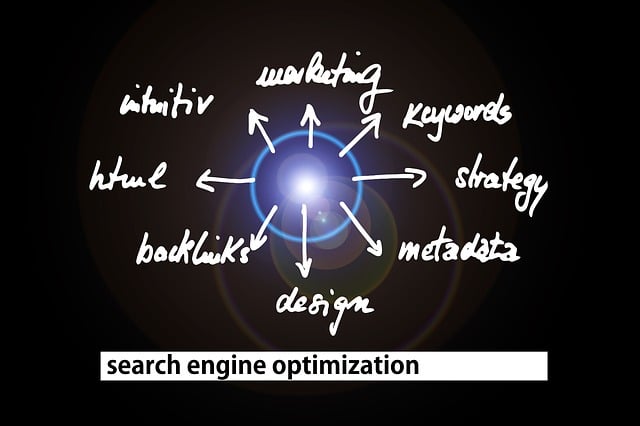Understanding Keyword Research and Optimization (KRO) is crucial for boosting online presence and attracting organic traffic through SEO. KRO aligns website content, structure, and performance with search engine algorithms, improving rankings for relevant searches. The process involves identifying user intent, analyzing search volume, assessing competition, and guiding content creation. This leads to higher visibility, increased traffic, and more conversions. Tools like Google Keyword Planner, SEMrush, Ahrefs, and Moz aid in keyword discovery, while Google Analytics tracks performance. Advanced strategies like semantic analysis and long-tail keyword targeting enhance content relevance and engagement. Future trends include AI-driven tools for trend prediction and a focus on user experience for voice search optimization.
In the digital realm, understanding Keyword Research and Optimization is paramount for online success. This comprehensive guide delves into the intricate world of SEO, providing a step-by-step approach to mastering keyword optimization. We explore the fundamentals, from deciphering search engine algorithms to identifying target keywords using advanced tools and techniques. Learn how to analyze search volume, uncover competitor insights, optimize on-page elements, and enhance off-page SEO—all crucial for boosting rankings. Discover advanced strategies and stay ahead of evolving trends in Keyword Research and Optimization.
Understanding SEO and Keyword Optimization: A Comprehensive Guide

Understanding SEO and Keyword Optimization is a crucial step in enhancing your online visibility and driving organic traffic to your website. Search Engine Optimization (SEO) is the process of optimizing content, structure, and performance of a site to increase its visibility on search engines like Google. By aligning your website with search engine algorithms, you ensure that it ranks higher for relevant searches, thereby attracting more potential customers.
Keyword Research and Optimization forms the backbone of effective SEO strategies. It involves identifying and targeting specific words or phrases (keywords) that your target audience uses when searching for products, services, or information related to your business. Thorough keyword research allows you to understand user intent, determine search volume, and assess competition, enabling you to select the most relevant and valuable keywords for optimization. This process then guides content creation, ensuring that your website’s content is both engaging and optimized for search engines, ultimately leading to improved rankings and increased online success.
The Role of Keyword Research in SEO Strategy

Keyword research is a foundational step in any successful SEO strategy. It involves identifying the terms and phrases that potential customers use when searching for products, services, or information related to your business. By understanding these keywords, you can tailor your content, meta tags, and overall online presence to align with user intent. This ensures that when users search for relevant topics, your website appears in their results, increasing visibility and traffic.
Effective keyword research and optimization go beyond just finding popular search terms. It includes analyzing competition, understanding user behavior, and evaluating long-tail keywords—phrases that are more specific and often have lower competition. Incorporating these insights into your SEO strategy allows for the creation of valuable content that resonates with your target audience, ultimately driving conversions and business growth.
Identifying Target Keywords: Tools and Techniques

Identifying target keywords is a crucial step in any successful SEO strategy, as it forms the foundation for effective keyword research and optimization. The first step involves brainstorming relevant terms that accurately describe your content’s focus. Tools like Google Keyword Planner, SEMrush, Ahrefs, and Moz offer invaluable insights into search volume, competition, and related keywords, making them indispensable for this process. These platforms provide a wealth of data, from popular search terms to long-tail keywords, helping you understand user intent and tailor your content accordingly.
Additionally, analyzing competitors’ content can offer profound insights. Tools such as SimilarWeb and BuzzSumo allow you to see which keywords your rivals are ranking for, providing a roadmap for identifying opportunities that could enhance your site’s visibility. Manual research techniques, including reviewing industry forums, studying backlinks, and examining competitor backlink profiles, also play a significant role in this phase. By combining these tools and techniques, you can create a robust list of target keywords that align with your content’s quality and purpose.
Analyzing Search Volume and Competitor Insights

Analyzing search volume is a crucial step in keyword research and optimization, providing valuable insights into consumer behavior and market demand for specific terms. Tools like Google Keyword Planner offer data on monthly search counts, enabling businesses to understand the popularity of keywords within their industry. This information is essential for identifying high-value targets that drive relevant traffic.
Competitor analysis is another vital aspect. By examining the keywords that competitors rank for, you can uncover valuable insights into the strategies they employ and identify gaps in their content. Tools such as SEMrush or Ahrefs allow you to spy on competitor rankings, discover their top-performing keywords, and gain a competitive edge in search engine results pages (SERPs).
Optimizing On-Page Elements for Keywords

Optimizing on-page elements is a crucial step in the SEO keyword optimization process, ensuring your website’s content is both engaging and search engine-friendly. This involves carefully integrating your targeted keywords into various components of your web pages. When conducting Keyword Research and Optimization, start by identifying relevant keywords and phrases that accurately represent your content. These keywords should reflect what users are searching for when they come across your site. Once identified, these keywords can be strategically placed in your page titles, headings, meta descriptions, and throughout the content itself.
Effective on-page optimization also includes refining your website’s structure to enhance user experience and search engine accessibility. This means creating a clear hierarchy using header tags, ensuring each page has unique and descriptive URLs, and implementing internal linking to connect related content. These techniques not only make it easier for visitors to navigate your site but also help search engines understand the context and relevance of your web pages.
Enhancing Off-Page SEO with Keyword Integration

Off-page SEO, a powerful component in the digital marketing landscape, involves optimizing your online presence beyond your website’s content. A key strategy within this realm is keyword integration, which leverages the power of external sources to boost search engine rankings. By conducting thorough Keyword Research and Optimization, businesses can uncover relevant terms and phrases that potential customers are actively searching for.
Integrating these keywords into strategic off-page elements such as backlinks from reputable websites, social media mentions, and influencer collaborations creates a diverse and compelling online profile. This approach ensures that your brand stays top of mind with search engines by demonstrating authority and relevance in your industry. Effective keyword integration not only enhances visibility but also fosters trust and credibility among potential clients.
Measuring and Evaluating Keyword Performance

Measuring and evaluating keyword performance is a critical step in any SEO strategy, allowing marketers to understand which keywords are driving organic traffic and conversions. Tools like Google Analytics provide valuable insights by tracking keyword rankings, click-through rates (CTRs), and conversion metrics. By analyzing these data points, businesses can identify high-performing keywords that should be prioritized for further optimization.
Keyword Research and Optimization plays a pivotal role in this process. It involves continuous monitoring of search trends, competitor analysis, and refining content strategies to align with user intent. Regularly updating content based on performance data ensures websites remain relevant and attract the right audience, ultimately improving SEO efforts.
Advanced Keyword Optimization Strategies

In the realm of Keyword Research and Optimization, advanced strategies empower content creators and marketers to go beyond basic techniques. One such strategy involves semantic keyword analysis, which delves into the nuances of user intent behind search queries. By understanding related terms and synonyms, content can be tailored to capture a broader range of searcher needs. This approach ensures that articles remain relevant and valuable, boosting their chances of ranking higher in search engine results.
Another powerful technique is the implementation of long-tail keywords. These are more specific and often less competitive than mainstream keywords. Targeting long-tail variants can significantly increase organic traffic by attracting users with intent closely aligned to what the content offers. This strategy requires deeper Keyword Research and Optimization, but it pays dividends in terms of higher conversion rates and a more engaged audience.
Future Trends in Keyword Research and SEO

The future of keyword research and optimization is poised for significant shifts, driven by evolving user behavior and technological advancements. With the rise of voice search and more natural language queries, understanding context and intent behind keywords will become even more critical. AI-powered tools are expected to play a pivotal role in this regard, analyzing vast amounts of data to predict trending topics and identify long-tail keywords that were once hard to uncover.
Additionally, as search engines continue to refine their algorithms, focusing on user experience and content relevance will be paramount. This means that keyword research should not only be about finding the right terms but also about understanding how these terms influence user behavior and engagement metrics. Optimizing content for both search engines and human audiences will become a key strategy, ensuring that websites provide valuable, relevant, and engaging information that meets the needs of users at every stage of their journey.
